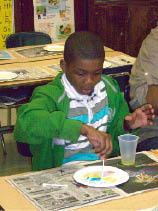Partners after School
“Is this a liquid, a gas or a solid?” Chereese Gardner, a student in TC’s Science Education program, stands before a group of second graders at P.S. 92 in West Harlem, holding up a quart of milk. Despite the dreary weather outside, the mood in the classroom is buoyant. Every hand flies up. • Today’s lesson, part of an after-school science program, focuses on the principles of cohesion and adhesion. The concept of adhesion—the tendency of dissimilar molecules to come together due to attractive forces—serves as an apt metaphor for the larger after-school program in which Gardner, who is also a Zankel Fellow, works: the Harlem Ivy 21st Century Community Learning Center. • Two years ago, TC received a $3.2-million grant from the New York State Department of Education to create science-based service learning programs that would focus on the STEM (science, technology, engineering and math) disciplines—subjects that have received less funding in recent years, especially in poorer schools. • In addition to teaching science, Harlem Ivy promotes service learning with projects that are student-driven, led by group leaders and coordinated by TC students. Examples include earthquake relief, a nutrition survey and a bullying-prevention project. • With a shared interest in working in underserved Harlem schools, TC joined forces with The After School Corporation (TASC), which had already been operating after-school programs in conjunction with four Harlem community-based organizations (CBOs): Children’s Art and Science Workshops, Harlem Children’s Zone, Harlem Dowling, and the New York City Mission Society. Each of the four sites—Public Schools 161, 115 and 92, and C.S. 154—has two graduate students working with CBO staff to facilitate service learning and STEM components throughout the school year. • Additionally, TC works with TASC and literacy provider Community-Word Project to host training workshops for CBO group leaders. • “The collaboration really seems to benefit the sites, which are getting enrichment they would not otherwise have,” says Samantha Freeman, Harlem Ivy Project Director. “The CBOs are strong, which is a rare and wonderful part of being in New York City. For TC students to have contact with them on a regular basis is invaluable.” • Back in the P.S. 92 classroom, students are engrossed in the cohesion-adhesion experiment. They add food coloring to a plate of milk, place a Q-tip that has been dipped in dish soap in the center, and watch the coloring swirl magically moving away from the middle of the plate.
Published Thursday, May. 20, 2010
